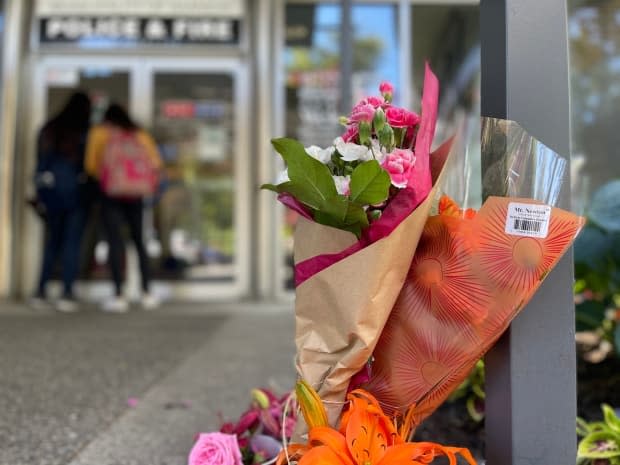Saanich, B.C., shootout witnesses recount lasting 'terrifying trauma' of bank robbery

Police in Saanich, B.C., announced Saturday that they're letting locals back into what was for days a crime scene, nearly a week after a shootout left six officers wounded and two bank robbers dead.
But for witnesses to the deadly violence last Tuesday, the trauma of the events lingers.
"The bullet [was] inside our Squeaky's Laundromat, so it was very terrifying … very close," said laundromat owner Edward Park, whose business faces the bank involved.
Twenty-two-year-old brothers identified as Mathew and Isaac Auchterlonie, from the city of Duncan, B.C., were killed outside a Bank of Montreal branch in Saanich. Six officers were shot.
Police on Saturday described the brothers as twins. But CBC News has since confirmed they were in fact triplets, with a sister, according to multiple sources who know the siblings.

When shots rang out, Park and his employees fell to the floor, seeking cover. Police revealed later they found a bullet just above their hiding place, in some blankets.
"We were very lucky," he said. He's since been focused on resuming his activities, serving customers.
"Maybe I'm a little strange ... but I have to go back into business," he said in an interview Thursday. "I think I can get over the kind of terrifying trauma. That's what I'm thinking."

The effects of witnessing violent incidents can last long after the police tape is taken down.
Some develop post-traumatic stress disorder (PTSD) — a condition that can include flashbacks, nightmares and intrusive memories, panic or emotional numbness, trouble controlling emotions, and a loss of self-esteem or self-worth, says B.C.'s Justice Ministry.
"Being a victim of crime ... is a traumatic experience that may produce physical, emotional and psychological responses you do not understand," says the province's website for victims. "It is important to know everyone experiences the effects of crime differently."
'It will likely replay in their minds over and over again'
Saanich police Chief Const. Dean Duthie says the day was distressing for everyone — witnesses, cops and bank staff. He thanked neighbours and businesses for their "understanding" amidst the disruption to their lives.
"It will likely replay in their minds over and over again," Duthie told reporters. "To all customers and staff, please know the Saanich police is thinking about you and hope you have support."
Duthie said B.C.'s police victims services are available in Saanich. The program supports any witnesses or victims of crime. There is also a confidential phone and text service, VictimLinkBC.

'It's like grief. You go through the whole stages'
Shelli Fryer was a customer held hostage in the Bank of Montreal. Her voice cracked with emotion as she recalled police entering the bank afterwards and apologizing for the ordeal she and over a dozen others had just endured.
"Those officers … had taken six of their brothers in arms away who had been injured running into the line of fire — to save us?" she said in an interview Wednesday.
Now, days later, she says her mood is still "back and forth."
The 59-year-old said she's been having trouble sleeping. On Canada Day, she was still wide awake at 2:54 a.m.
Supportive messages pouring in since Tuesday, she said, have offered some of the comfort she's sought, and commended her bravery during the ordeal.
"There is just so much love I'm getting from all these strangers,'' she said.
Fryer has been mentally replaying Tuesday morning's events ever since.
The trauma of being held hostage comes in waves, she said. She spoke with victim services and was told it will take time to process what she's been through.
She compared it to what some see as common "stages of grief," though psychologists say not everyone processes loss in the same way or order.
"It's back and forth, you know?" she said. "It's like grief. You go through the whole stages, right?
"Sometimes you may never hit the last stage.''


